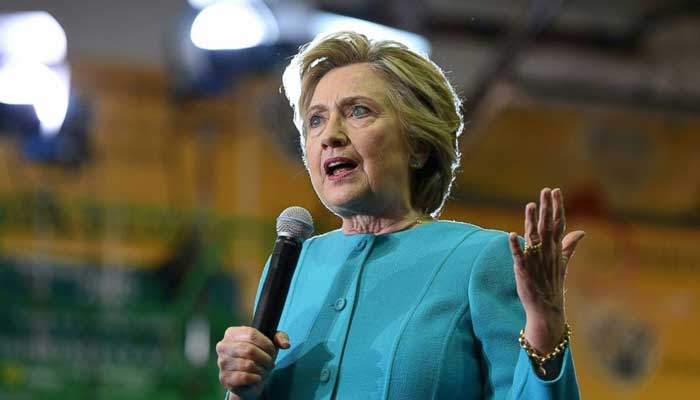US federal judge rules Hillary Clinton can be deposed over email scandal
March 03, 2020

A years-long pursuit into Hillary Clinton’s emails pertaining to State Department affairs took a vital turn on Monday when a judge ruled that she could be deposed, reported CNN.
Judge Royce Lamberth's order has authorised Judicial Watch, a right leaning group, to question Clinton – who was secretary of state in 2009 - and others over the use of a private server to store emails versus the standard state.gov email account, owned and managed by the US government.
"Any further discovery should focus on whether she used a private server to evade [the Freedom of Information Act] and, as a corollary to that, what she understood about State's records management obligations," Lamberth wrote in his order.
According to CNN, Judicial Watch had sought to depose Clinton, top aide Cheryl Mills and other former State Department employees in a six-year-old court case arguing public access to the emails must be provided.
Read also: Hillary Clinton rules out another presidential run
Lamberth, in his order, also allowed the group to depose two State Department technology managers who worked on Clinton's email management, as well as Mills, said the US publication.
Judicial Watch, however, cannot question Clinton or Mills about the US government's response to the 2012 Benghazi attack, Lamberth said.
In addition, the judge ruled that Google can be subpoenaed so Clinton’s email records while she was secretary of state can be obtained.
"The Court is not confident that State currently possesses every Clinton email recovered by the FBI; even years after the FBI investigation, the slow trickle of new emails has yet to be explained," Lamberth wrote. "For this reason, the Court believes the subpoena [to Google] would be worthwhile and may even uncover additional previously undisclosed emails."
Clinton’s emails have already undergone investigation by the Congress, the State Department inspector general and the FBI, and she previously gave written answers in another lawsuit.
Read also: Hillary Clinton hits back at Donald Trump with 'Mean Girls' gif
Lamberth, however, believes that a series of questions remain unanswered. According to CNN, he pointed to a possibility that the State Department “acted in bad faith when it told Judicial Watch no records existed previously, before producing late last year 30 Clinton emails that were previously undisclosed”.
"How did she arrive at her belief that her private server emails would be preserved by normal State Department processes for email retention?" Lamberth wrote.
"Did she realise State was giving 'no records' responses to FOIA requests for her emails? If so, did she suspect that she had any obligation to disclose the existence of her private server to those at State handling the FOIA requests? When did she first learn that State's records management employees were unaware of the existence of her private server? And why did she think that using a private server to conduct State Department business was permissible under the law in the first place?"
Judicial Watch President Tom Fitton welcomed the ruling in a statement issued on Monday.
"Judicial Watch uncovered the Clinton email scandal and we're pleased that the court authorised us to depose Mrs. Clinton directly on her email conduct and how it impacted the people's 'right to know' under FOIA," said Fitton.





